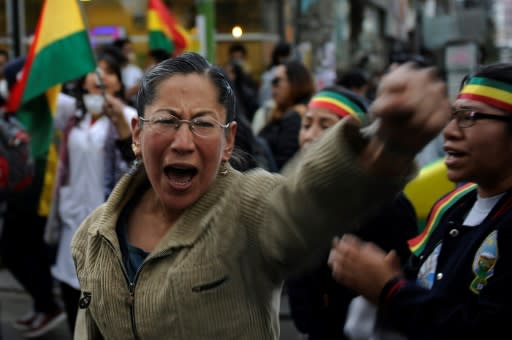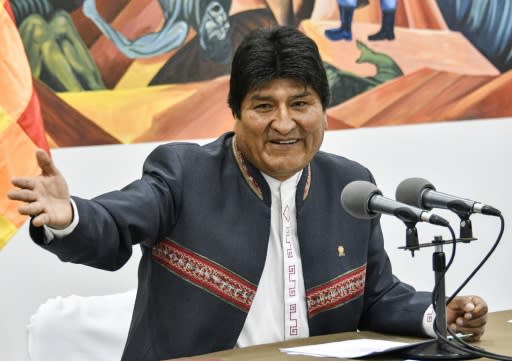Defeated Bolivian challenger rejects election result as 'fraud'
Defeated Bolivian presidential candidate Carlos Mesa on Saturday rejected the controversial re-election of President Evo Morales, describing the vote result as fraudulent. The October 20 election sparked riots and protests after a sudden change in the ballot count extended Morales's lead over Mesa, helping the incumbent achieve the 10-point margin needed for an outright first-round victory. Mesa read a statement to reporters, saying he "rejected and ignored the closure of the national count of the general elections... because it is the result of fraud and a breach of the popular will." With all the votes counted, the Supreme Electoral Tribunal (TSE) gave Morales 47.08 percent and Mesa 36.5 percent. Morales, 60, urged those who accuse him of fraud to provide evidence, as he spoke from military anti-narcotics headquarters in the country's central Chapare province, his political cradle. "We aren't hiding anything, we aren't lying. You don't want to think about this fraud, of which they've given no proof. Everything is lies and lies," he said. Clashes between rival groups broke out on Friday, while pro-Mesa protesters draped in Bolivia's red, yellow and green flag blocked roads in La Paz with barricades of tires, rope and trash cans. Backed by a collective of centrist and right-wing parties, former president Mesa (2003-05) has called on his supporters to maintain street protests. - Calls for a runoff - The official result means Morales has won a fourth successive term despite the constitution he promulgated in 2009 limiting presidents to two mandates. The country's highest court, considered friendly to Morales, overturned the term-limit rule. Morales on Saturday said he would be happy to contest a second round if there was any evidence of graft. "If there is fraud, the next day we call the second round," he said. The European Union, United States, Brazil, Argentina and Colombia have called for a second-round runoff to restore trust and confidence in the electoral process. Following the international outcry, Morales suggested that the Washington-based Organization of American States (OAS) conduct an audit, to which its secretary-general Luis Almagro agreed. "We have heard the position of the foreign ministries of #Colombia, #Argentina, #Brazil and the #US," Morales tweeted. "I invite those and other countries to participate in the audit we have proposed." OAS had already expressed "surprise" and "concern" over the sudden shift in official tallies, which increased Morales's lead, and has agreed to look into the results. - 'Not considered legitimate' - "These results should not be considered legitimate until the end of the requested scrutiny process," said Almagro. UN Secretary-General Antonio Guterres said Friday he "fully" supported OAS scrutiny, though no date or conditions for such an undertaking have been publicized. The TSE has been heavily criticized for its conduct of the vote count, including by its own vice president, who resigned. Already president since 2006, Morales will now remain in the post until 2025. In 2016, he tried to overturn term limits but lost a referendum. Yet a year later, the Constitutional Court authorized him to stand. A supporter of Bolivian opposition candidate Carlos Mesa blocks an avenue in Santa Cruz, Bolivia, as a protest against election results confirming President Evo Morales as the winner A woman shouts during a protest in La Paz against election results giving Evo Morales a fourth presidential term; his challenger Carlos Mesa has denounced the count as 'fraud' President Evo Morales, declared the winner of recent elections in Bolivia, has promised to hold a new round of voting if proof of fraud emerges; he is seen here speaking to reporters in La Paz on October 24, 2019 Bolivian politician Carlos Mesa, seen arriving in La Paz for an October 24, 2019 news conference, has rejected recent vote results favoring President Evo Morales as a fraud





